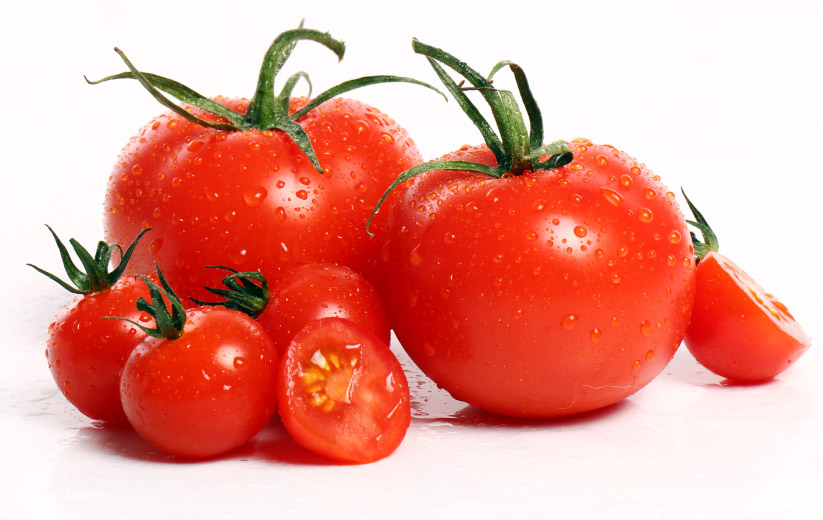Tomatoes are native to South America. Although considered a fruit, tomatoes are often eaten and processed as a vegetable. The composition of tomatoes includes the antioxidant lycopene, which has many health benefits such as reducing the risk of heart disease and cancer.
1. Nutritional value of tomatoes
The highest percentage of tomatoes is 95% water, and the remaining 5% mainly consists of carbohydrates and fiber. In 100 grams of raw tomatoes, there are the following nutrients: 18 kcal, 0.9 grams of protein, 3.9 grams of carbs, 2.6 grams of sugar, 1.2 grams of fiber, and 0.2 grams of fat.
- Carbs in tomatoes include Simple sugars, such as glucose and fructose, which make up nearly 70% of the carb content.
- Fiber: Provides about 1.5 grams in each medium-sized tomato. 87% of the fiber in tomatoes is insoluble fiber, in the form of hemicellulose, cellulose, and lignin.
- Vitamins and Minerals: Tomatoes are a great source of many vitamins and minerals: Vitamin C, is an essential nutrient that acts as an antioxidant. Using one medium-sized tomato can provide the body with about 28% of the Reference Daily Intake (RDI). Potassium, an essential mineral, is beneficial for controlling blood pressure and preventing heart disease. Vitamin K1, or phylloquinone, is important for blood clotting and bone health.
Folate (vitamin B9) One of the B vitamins, folate is important for normal tissue growth and cell function. Especially important for pregnant women.
2. Other Plant Compounds in Tomatoes
The composition of vitamins and plant compounds in tomatoes can vary by cultivar, and habitat. The main plant compounds in tomatoes are:
- Lycopene. Has a red pigment and acts as an antioxidant. Lycopene’s health benefits have been studied extensively.
- Beta carotene, the antioxidant that normally gives food its yellow or orange color, is converted to vitamin A in the body.
- Naringenin. This flavonoid compound, found in tomato skins, has been shown to reduce inflammation and protect against various diseases in mice.
- Chlorogenic acid. A potent antioxidant compound, chlorogenic acid may lower blood pressure in people with high levels.
- Chlorophyll and carotenoids (such as lycopene) contribute to the rich color of tomatoes. As ripening begins, chlorophyll (green) is broken down and carotenoids (red) are synthesized.
Lycopene carotenoids are most abundant in ripe tomatoes, particularly notable when it comes to the fruit’s plant compounds. It is found in the highest concentrations in tomato skins. The redder the tomato, the higher the lycopene content.
Tomato products, such as ketchup, tomato juice, and tomato paste, are all the richest dietary sources of lycopene in the Western diet, providing more than 80% of the lycopene in the diet. diet in the United States.
The lycopene content in processed tomato products is often much higher than in fresh tomatoes. For example, ketchup boasts 10–14 mg of lycopene per 100 grams, while a 100-gram fresh tomato contains only 1–8 mg.
However, ketchup is usually consumed in very small amounts. Therefore, lycopene intake can be easily increased by eating unprocessed tomatoes, which also have much less sugar than ketchup.
Other foods in your diet can strongly affect lycopene absorption. Using this plant compound in combination with fat can increase absorption by up to four times. However, not everyone can absorb lycopene at the same rate.

3. Health benefits of tomatoes
What are the benefits of eating tomatoes? Consuming tomatoes and tomato-based products have been linked to improved skin health and a reduced risk of heart disease and cancer.
3.1. Heart health
- Heart disease includes heart attack and stroke, the most common causes of death in the world.
- Research done in middle-aged men has found a link between low blood levels of lycopene and beta-carotene with an increased risk of heart attack and stroke. The effects of tomatoes are increasing, with evidence from clinical trials showing that lycopene supplementation can help lower LDL cholesterol.
- Clinical studies of tomato products have also shown benefits against inflammation and markers of oxidative stress. In addition, the chemical composition of tomatoes has also shown a protective effect on the inner layer of blood vessels and may reduce the risk of blood clots.
3.2. Prevent cancer
- Cancer, the uncontrolled growth of abnormal cells, spreads beyond their normal boundaries and often invades other parts of the body.
- Observational studies have documented an association between tomatoes or tomato products and lower rates of prostate, lung, and stomach cancers.
- Although high levels of lycopene are believed to affect cancers, high-quality human studies are needed to confirm the cause of these benefits.
- Research conducted in women shows that high concentrations of carotenoids found in large amounts in tomatoes may protect against breast cancer.
3.3. Tomatoes are good for skin health
- Foods made from tomatoes are rich in lycopene and other plant compounds that may protect against sunburn. So, what are the benefits of eating tomatoes every day? According to one study, people who ate 40 grams of tomato paste that provided 16 mg of lycopene with olive oil daily for 10 weeks were 40% less likely to experience sunburn.
- Also, is it good to eat tomato seeds? Tomato seeds in the intestinal tract are not digested, sometimes they can enter the appendix causing appendicitis.
Tomatoes are juicy, full of antioxidants, and may help fight several diseases. What’s more, tomatoes are particularly high in lycopene, a plant compound linked to improved heart health, cancer prevention, and protection against sunburn. Use tomatoes in your daily meals for a healthy diet. Therefore, a diet with tomatoes is very good and necessary for our health.
Follow the website ongreenbeauty.com to get more health, nutrition, and beauty information to protect the health of yourself and your loved ones in your family.




